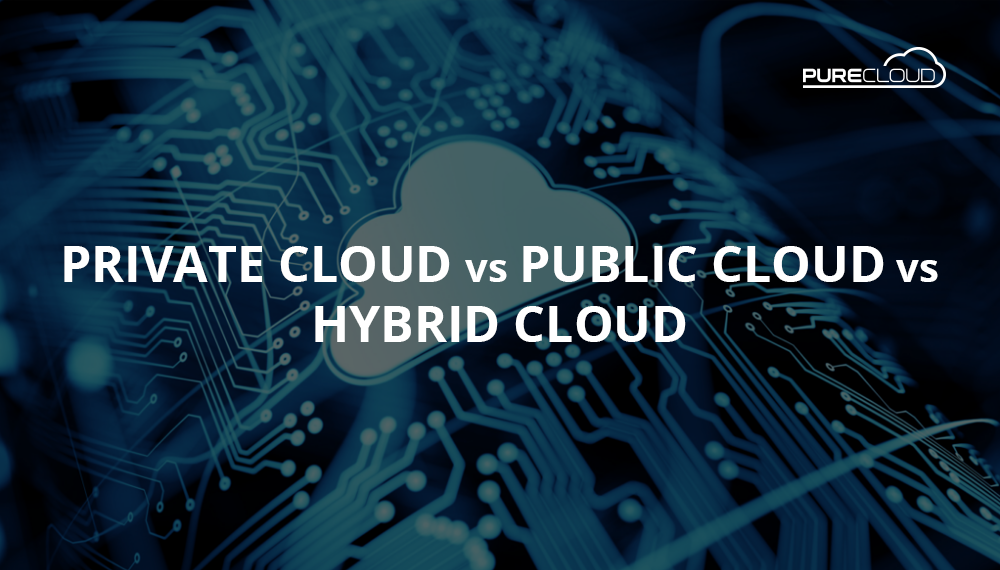Adopting a cloud environment can drive cost savings and support fast-moving business transformation. But to do this successfully, it’s important that you integrate the right cloud environment for your business. Discover the differences between private, public and hybrid cloud environment’s and determine which is best for your business!
PRIVATE CLOUD
Private cloud is specifically intended for one organisation. Only employees that work at that business have access to their cloud software and it is completely isolated from outside users. It’s built around your business requirements, enabling you to have complete oversight and control over your data and business solutions.
ADVANTAGES
Flexibility
One benefit of the private cloud is that it enables you to have your infrastructure based within the facilities of your organisation, giving you more control and flexibility. Businesses can, however, host their private cloud with a third party to keep costs down.
Private cloud is supported by reliable software and hardware which is maintained in a private network and utilised by virtualisation. With private software, users have the flexibility to modify resources and update the cloud through one operating system.
Strong Security & Compliance
It’s important to employ strong security guidelines to protect integrity, confidentiality, and the external and internal use of information, to avoid data breaches and the exposure of sensitive data.
Implementing the private cloud can assist with compliance issues by giving you complete control over the level of security you want to apply to your business. You can manage your infrastructure centrally, making changes to your storage, bandwidth, and security measures to ensure you’re adhering to compliance rules and GDPR regulations.
Guaranteed Resource
With the private cloud you don’t have to share your resources with outside organisations, and you can therefore increase resources as and when you need them. If you experience complications with one of your servers, you have full assurance that your data will be virtualised from a previous back up, making it available to you through an alternative server almost immediately.
Having the equivalent of multiple servers all through one database, will reduce power usage whilst being easier to operate and manage, increasing business efficiency.
DISADVANTAGES
Cost
Utilising private cloud is generally more expensive as it is generally a tailored solution for your business. More time and planning goes into constructing private cloud because its built specifically for your business needs.
It also requires hardware and maintenance, which is more costly than a public cloud environment.
Maintenance
The set up and maintenance of private cloud can be fairly time consuming. The management benefits it offers usually means you will require on-site IT admins, which demonstrates the level of support and upkeep private cloud can need.
Deployment & Support
As private cloud operates internally only, there’s more complexity when it comes to deployment and it’s likely a specialist would be needed to manage the roll-out.
It’s also more difficult to deploy on a wider, more advanced scale, as implementing private cloud requires additional resources, which can be very time consuming and can cause problems as you grow.
PUBLIC CLOUD
Public cloud is a hosting solution which is offered by third party suppliers and is run remotely. Businesses can gain access to their data and resources via the internet. Public cloud can vary from free usage to sold on demand, which gives customers the flexibility to only pay for what they have consumed.
ADVANTAGES
Cost Saving
Utilising public cloud can save you a lot of money that can be invested into other areas of the business. Unlike private cloud, you can save money by avoiding the purchase of software and limiting the expense of maintaining your own infrastructure.
With public cloud, your provider is responsible for the upkeep of the system, which is managed remotely, unlike private cloud, where all maintenance is on-premise.
Advanced Security
Most businesses question the level of security when operating on a public cloud solution, but when installed and managed correctly, the public cloud environment can be just as secure as when using a private infrastructure.
It’s important to ensure the provider you select has implemented a sufficient level of security measures, to protect your business and your data.
Set up & Access
Public cloud can be deployed a lot faster and a lot easier than private cloud. Businesses can deploy public cloud by purchasing an application and the process is managed remotely via the cloud.
It’s a relatively quick process and every employee has access to all the same resources and applications, as long as you’re connected to the internet.
DISADVANTAGES
Lack of Close Support
Public clouds solutions are quite common, and this can result in businesses getting more generic support from their provider due to demand.
Organisations usually experience a lack of close support as the cloud supplier must manage numerous of other businesses who also require the same service.
When you pay more for private cloud, you are investing in the quality of the service, which means you get consistent, tailored support and clarity from your provider.
Lack of Customisation
As organisations grow, the need for additional solutions is a necessity. With public cloud however, if businesses require additional features to their existing service, it’s unlikely the providers could accommodate this.
There is more flexibility to integrate customised benefits if you use private cloud as you’re paying for a premium service, which means providers can add options that are required specifically for your business needs.
With a standard cloud service, you are limited to what you can modify, so you just have to hope that new features are developed and integrated in the future.
Reliant on Internet Connection
Utilising public cloud means that you have less guarantee of resources as it’s solely reliant on a consistent internet connection. Without this, you will experience lack of productivity and business continuity.
The only way to ensure a consistent level of access when using public cloud is to invest in a more reliable internet connection like a leased line or utilising a built in VPN.
HYBRID CLOUD
Hybrid cloud is a fusion between private and public cloud, with an integrated-on premise infrastructure. Businesses can combine elements from the public and private cloud to fit their business needs, whilst also keeping costs down.
The benefit of hybrid cloud is the flexibility it offers and the exposure it gives to multiple other IT services. The cloud offers a degree of workload portability with management across two cloud environments.
ADVANTAGES
Improved Business Continuity & Disaster Recovery
When investing in one cloud software, you must rely on the capabilities and expertise of one provider to manage and mitigate any problems that arise.
With hybrid cloud you have more reassurance that you are covered and protected for any eventuality, due to the combination of both cloud environments. You can guarantee the reliability as the services are distributed across multiple platforms.
Long Term Cost Saving
Hybrid cloud might be expensive initially due to the fusion of different cloud environments that are customised for your business needs, but in the long run it would offer an array of cost savings for your company.
Businesses that need to transfer data to an alternative location, may find it time consuming and costly to do this via public cloud for example. But a hybrid cloud solution has the ability to do this, and to do it at scale, which makes business growth more cost effective in the future.
Better Performance & Scalability
The benefits of utilising hybrid cloud is the level of control that you have over your business infrastructure. Important documents can be stored in a private cloud environment whilst other resources can be kept in a public domain, giving businesses the flexibility to manage their workload at their leisure, whilst having the option to scale up if required.
The luxury of hybrid cloud is the access to on demand services at any time. Businesses can utilise this to improve their operations, which will enhance business performance.
DISADVANTAGES
Security Concerns
While public cloud vendors do as much as they possibly can to secure their public cloud environments from external threats, the responsibility for security in the hybrid cloud ultimately falls to your business, as the private cloud section is managed by your own IT.
The nature of a hybrid cloud infrastructure introduces additional security checks, such as identifying hidden vulnerabilities between the public & private environments and ensuring that users can authenticate and access data the same way across the board.
Lack of Data Visibility
It is much more difficult to maintain visibility over cloud data usage in a hybrid cloud environment because you are making use of two different environments with their own variables. The lack of visibility can cause cost issues, with organisations leaving idle instances running or using unsuitable cloud storage options.
The lack of visibility can also affect compliance with data protection laws as data moves between private and public cloud systems that are managed by different bodies, and organisations might not be certain that their public cloud provider is compliant with important regulations in the country they are using it from. This is a particular issue with data stored in the USA and accessing it from the EU for example.
Networking Bottleneck
Networking bottlenecks can exist when transferring large amounts of data between private and public cloud, and this would be expected in a large enterprise.
The data transfer to the public cloud is done via the internet and the transfer speed might be too slow between the two to meet a large enterprise’s IT needs.
ADOPT THE RIGHT CLOUD SERVICE FOR YOUR BUSINESS
85% of businesses worldwide are already utilising the cloud to increase efficiency, add visibility, regain control, and improve business performance.
Choosing the right cloud environment will ultimately depend on the size of your organisation, your growth plans, and your ongoing technology strategy.
All three options have their benefits and their drawbacks, so careful planning is required to ensure you implement a solution that supports your business needs now and in the future.

YOUR BUSINESS CLOUD ENVIRONMENT
Are you looking to adopt a cloud environment, but not sure which option to choose? Contact a member of our PCS team for further support and advice.
Call us on 0333 150 6780, email or fill out the contact form below and a member of the team will be in touch.








Recent Comments